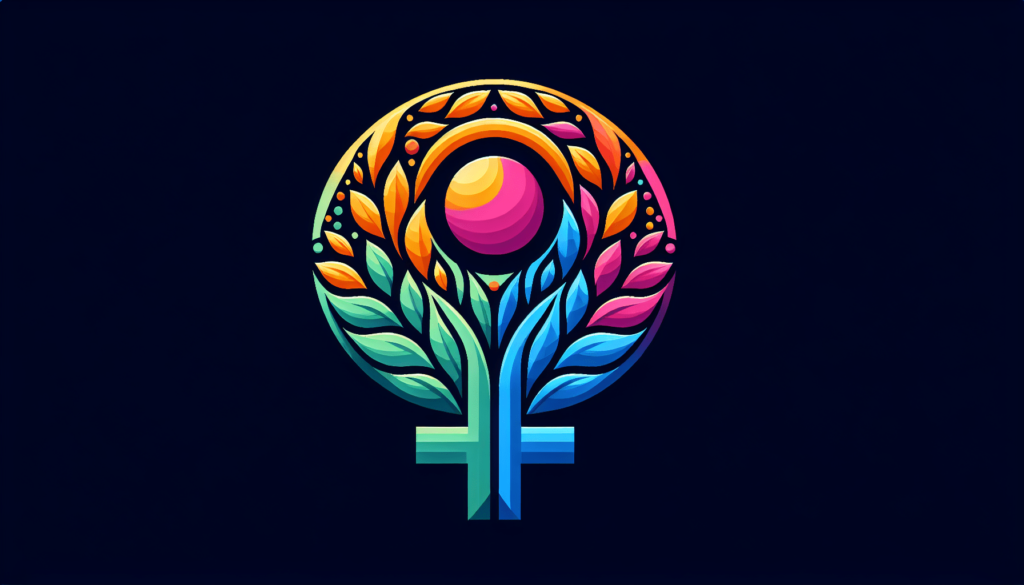Are you looking to prioritize your well-being and take charge of your health? Look no further than holistic medicine, specifically tailored for women. In this article, we will explore the empowering world of women’s health in holistic medicine, delving into the various approaches and techniques that can support your overall wellness. From the importance of mind-body connection to the incorporation of alternative therapies, join us as we uncover the key aspects of holistic medicine that can help you achieve a balanced and empowered life.

The Importance of Holistic Medicine for Women’s Health
In today’s fast-paced world, women often find themselves juggling multiple responsibilities and facing unique health challenges. That’s where holistic medicine comes in. It offers a comprehensive approach that recognizes the intricate connection between the mind, body, and spirit, allowing women to address the root causes of their health issues and find true balance. Holistic medicine goes beyond simply treating symptoms; it aims to support women’s overall wellbeing and empower them to take control of their health.
A Comprehensive Approach to Women’s Health
Holistic medicine takes a comprehensive approach to women’s health by considering all aspects of a woman’s life. It recognizes that physical health is deeply influenced by mental, emotional, and spiritual factors. By addressing these interconnected elements, holistic medicine empowers women to achieve true wellness.
Recognizing the Mind-Body Connection
One of the key principles of holistic medicine is recognizing the mind-body connection. Our thoughts, emotions, and beliefs can have a profound impact on our physical health. By understanding this intricate relationship, holistic practitioners can help women address underlying emotional issues that may contribute to their health concerns. Techniques such as cognitive-behavioral therapy can be valuable in promoting mental and emotional wellbeing.
Addressing the Root Causes of Health Issues
Instead of merely alleviating symptoms, holistic medicine focuses on identifying and addressing the root causes of health issues. This approach allows women to achieve long-lasting results and prevent future problems. Holistic practitioners may use various diagnostic tools and techniques to understand the underlying imbalances in a woman’s body. Recognizing that each woman is unique, they personalize treatment plans to target the specific needs of the individual.
The Role of Nutrition in Women’s Health
Proper nutrition plays a pivotal role in women’s health, affecting hormone balance, energy levels, and overall wellbeing. Holistic medicine emphasizes the importance of a balanced and nourishing diet, helping women achieve optimal health from the inside out.
Balancing Hormones through Diet
Hormone balance is crucial for women’s health, and nutrition plays a significant role in achieving and maintaining that balance. Certain foods can support hormone production and regulation, while others can have a negative impact. Holistic practitioners can guide women in making dietary choices that support hormone balance, reduce PMS symptoms, and promote overall wellbeing.
Key Nutrients for Women’s Health
There are specific nutrients that are particularly important for women’s health. For instance, iron is essential for maintaining healthy blood and preventing anemia, which can be common in women. Calcium and vitamin D are crucial for bone health, especially during menopause when women are at a higher risk of osteoporosis. Other essential nutrients include omega-3 fatty acids, magnesium, and B vitamins, which support a range of bodily functions and promote overall wellness.
The Impact of Gut Health on Overall Wellbeing
Gut health is increasingly being recognized as a vital aspect of overall wellbeing, with research suggesting that it plays a role in various health conditions. Holistic medicine acknowledges the importance of gut health for women’s wellness and focuses on improving the balance of gut microbiota through dietary changes and, if necessary, the use of probiotics or other supplements. By promoting a healthy gut, holistic practitioners can help women enhance their digestion, boost their immune system, and support mental wellbeing.
Herbal Medicine for Women’s Wellness
For centuries, traditional herbs have been used to support women’s health. Herbal medicine, a fundamental aspect of holistic medicine, harnesses the healing power of nature to address a wide range of women’s health concerns.
Traditional Herbs for Women’s Health
Traditional herbs have long been used to support women’s specific health needs. For example, chaste tree berry has been used for centuries to promote hormonal balance and regulate menstrual cycles. Dong quai is another popular herb known for its benefits in relieving menstrual cramps and supporting reproductive health. By incorporating these and other traditional herbs into a woman’s wellness plan, holistic practitioners can provide natural solutions for common health issues.
Natural Remedies for Menstrual Cramps
Menstrual cramps affect many women and can significantly impact their quality of life. Herbal medicine offers natural remedies that can help alleviate menstrual cramps and promote comfort during this time of the month. Herbs such as ginger, turmeric, and cramp bark have been used for their anti-inflammatory and pain-relieving properties. Holistic practitioners can provide guidance on the safe and effective use of these herbal remedies.
Supporting Reproductive Health with Herbs
Holistic medicine recognizes the unique needs of women’s reproductive health and offers herbal remedies to support fertility, ease symptoms of conditions such as polycystic ovary syndrome (PCOS) and endometriosis, and maintain a healthy reproductive system. Herbs like black cohosh and red raspberry leaf are known for their beneficial effects on reproductive health. By utilizing these natural remedies, women can take an active role in promoting their reproductive wellbeing.
The Benefits of Acupuncture for Women’s Health
Acupuncture, an ancient practice rooted in Traditional Chinese Medicine, has gained recognition in Western medicine for its numerous benefits. When it comes to women’s health, acupuncture can be particularly effective in regulating menstrual cycles, relieving PMS symptoms, and supporting fertility and pregnancy.
Regulating Menstrual Cycles and Hormones
Acupuncture has been found to help regulate menstrual cycles by restoring balance to the hormonal system. By stimulating specific acupuncture points, practitioners can help address the underlying imbalances that contribute to irregular or painful periods. Regular acupuncture sessions can promote regular menstrual cycles and alleviate associated symptoms such as bloating, breast tenderness, and mood swings.
Relief from PMS Symptoms
Many women experience premenstrual syndrome (PMS) symptoms that can greatly impact their quality of life. Acupuncture offers a natural and effective approach to managing these symptoms. By targeting specific acupuncture points, practitioners can help reduce pain, bloating, mood swings, and other discomforts associated with PMS. Regular acupuncture sessions leading up to the menstrual cycle can provide significant relief and support women’s emotional wellbeing.
Supporting Fertility and Pregnancy
Acupuncture has been widely used to support fertility and enhance the success of assisted reproductive treatments such as in vitro fertilization (IVF). It can help regulate hormones, improve blood flow to the reproductive organs, and reduce stress levels, all of which can significantly improve the chances of conception. Acupuncture is also beneficial during pregnancy, helping to alleviate common discomforts such as nausea, back pain, and fatigue, while promoting a healthy and balanced pregnancy.
Mind-Body Therapies for Women’s Wellness
Holistic medicine recognizes the importance of addressing mental and emotional wellbeing for overall women’s wellness. Mind-body therapies such as stress reduction techniques, yoga, meditation, and cognitive-behavioral therapy can be powerful tools in empowering women to achieve optimal health and balance.
Stress Reduction Techniques for Hormonal Balance
Stress can have a significant impact on hormone balance, leading to a wide range of health issues. Mind-body therapies, such as deep breathing exercises, mindfulness meditation, and stress reduction techniques, can help women manage stress and promote hormonal balance. By incorporating these practices into their daily routines, women can enhance their overall wellbeing and prevent the negative effects of chronic stress.
Yoga and Meditation for Emotional Wellbeing
Yoga and meditation are well-known practices that promote emotional wellbeing and stress reduction. These mind-body therapies offer numerous benefits for women’s mental health, including reducing anxiety and depression symptoms, improving self-esteem, and promoting a sense of calm and inner peace. Regular yoga and meditation practice can help women cultivate a positive mindset and better cope with the challenges of everyday life.
Cognitive-Behavioral Therapy for Mental Health
Cognitive-behavioral therapy (CBT) is a widely recognized and evidence-based approach to treating mental health conditions. It focuses on identifying and changing negative thought patterns and behaviors that contribute to emotional distress. For women struggling with anxiety, depression, or other mental health issues, CBT can provide effective tools for managing symptoms and improving overall mental wellbeing. Holistic practitioners may integrate CBT techniques into their approach to help women achieve lasting emotional balance.
Bodywork Therapies for Women’s Health
Bodywork therapies, such as massage therapy, chiropractic care, and reiki, can be valuable additions to a woman’s holistic wellness plan. These therapies address physical imbalances, release tension, and promote energy balance, contributing to overall health and wellbeing.
Massage Therapy for Pain Relief
Massage therapy is a popular and effective treatment for relieving pain, reducing muscle tension, and promoting relaxation. For women dealing with conditions such as menstrual cramps, back pain, or migraines, massage therapy can provide significant relief. By targeting specific areas of tension and employing techniques such as Swedish massage or deep tissue massage, massage therapists can help women find relief from pain and support their overall physical and emotional wellbeing.
Chiropractic Care for Spinal Health
Chiropractic care focuses on aligning the spine and improving the functioning of the nervous system. For women, chiropractic care can address a range of health concerns, including menstrual pain, pregnancy-related discomforts, and musculoskeletal imbalances. By ensuring optimal spinal health, chiropractic treatment can help women improve their overall physical wellbeing and reduce pain and discomfort.
Reiki for Energy Balance
Reiki is a gentle, non-invasive healing practice that promotes energy balance and relaxation. By channeling healing energy through the hands, reiki practitioners can help restore physical, mental, and emotional balance. For women seeking a holistic approach to wellness, reiki can support overall health and wellbeing by reducing stress, enhancing relaxation, and promoting energetic harmony.

Holistic Approaches to Menopause
Menopause is a significant transition in a woman’s life, often accompanied by a range of physical and emotional changes. Holistic medicine offers natural remedies and self-care practices to support women during this phase and help them embrace the transition with confidence and empowered wellbeing.
Natural Remedies for Menopause Symptoms
Holistic medicine recognizes that women may experience various menopause symptoms, such as hot flashes, night sweats, mood swings, and sleep disturbances. Instead of relying solely on hormone replacement therapy (HRT), holistic practitioners can offer natural remedies to manage these symptoms. For example, herbs like black cohosh and sage have been traditionally used to alleviate hot flashes and promote hormonal balance. Dietary modifications, stress reduction techniques, and mind-body therapies may also be recommended to support women through this transformative phase of their lives.
Supporting Bone Health during Menopause
During the menopausal years, women are at an increased risk of bone loss and osteoporosis. Holistic medicine takes a proactive approach to support bone health during this time. Various strategies can be implemented, such as ensuring adequate calcium and vitamin D intake, engaging in weight-bearing exercises, and promoting hormonal balance. Holistic practitioners can guide women in making lifestyle changes that optimize bone health and reduce the risk of fractures and other bone-related issues.
Embracing the Transition with Self-Care Practices
Menopause is not just a biological process; it also represents a significant life transition. Holistic medicine encourages women to embrace this stage of their lives with self-care practices that honor their physical, emotional, and spiritual needs. Self-care practices may include adopting a healthy and balanced lifestyle, engaging in stress reduction techniques, practicing mindfulness, and cultivating a positive mindset. By prioritizing self-care, women can navigate the menopausal years with grace and embrace the wisdom that comes with this transformative phase.
The Impact of Environmental Factors on Women’s Health
In addition to addressing internal factors, holistic medicine recognizes the importance of considering external influences on women’s health. Environmental factors, such as endocrine disruptors and toxins, can have a significant impact on women’s hormonal balance and overall wellbeing.
Understanding Endocrine Disruptors and Toxins
Endocrine disruptors are chemicals that can interfere with the functioning of the hormonal system, potentially leading to health issues. These chemicals are commonly found in everyday products, such as plastics, pesticides, and personal care items. Holistic medicine educates women about the potential risks associated with endocrine disruptors and encourages them to make informed choices to minimize exposure. By reducing exposure to these harmful chemicals, women can support their hormonal health and reduce the risk of reproductive issues, hormonal imbalances, and other health concerns.
Creating a Healthy Home Environment
Creating a healthy home environment is crucial for women’s health and the wellbeing of their families. Holistic medicine emphasizes the importance of eliminating or reducing toxins in the home. This may involve using natural cleaning products, choosing organic and non-toxic personal care items, and ensuring proper ventilation to minimize indoor air pollution. By creating a healthy and toxin-free home environment, women can promote their own wellbeing and that of their loved ones.
Protecting Against Harmful Chemicals
Beyond the home environment, holistic medicine encourages women to be mindful of the potential exposure to harmful chemicals in their daily lives. This includes being aware of ingredients in cosmetics and personal care products, choosing organic and pesticide-free foods, and avoiding plastics and other products that may contain endocrine disruptors. By taking proactive steps to protect themselves against harmful chemicals, women can safeguard their health and reduce the risk of hormone-related issues and other health concerns.
Empowering Women’s Mental Health in Holistic Medicine
Mental health is a crucial aspect of women’s overall wellbeing, and holistic medicine recognizes the importance of empowering women to prioritize their mental and emotional health. By offering holistic approaches to anxiety, depression, and other mental health conditions, women can find support and guidance in achieving lasting emotional balance.
Holistic Approaches to Anxiety and Depression
Anxiety and depression are prevalent mental health conditions that affect many women. Holistic medicine offers various approaches to support women in managing these conditions, including dietary modifications, stress reduction techniques, mind-body therapies, and natural remedies. By taking a holistic approach to anxiety and depression, women can address the root causes of these conditions and experience long-lasting relief.
Supporting Emotional Wellbeing through Therapy
Therapy can be a valuable resource for women seeking support in managing their mental and emotional wellbeing. Holistic medicine acknowledges the benefits of therapy in helping women process emotions, develop coping strategies, and navigate life’s challenges. Whether through individual therapy, group therapy, or support groups, women can find a safe and supportive space to explore their feelings and work towards positive change.
Exploring Alternative Treatments for Mental Health
In addition to traditional therapy, holistic medicine embraces alternative treatments for mental health conditions. This may include practices such as acupuncture, herbal medicine, aromatherapy, and energy healing. By exploring these alternative treatments, women can find additional tools to support their mental health and wellbeing. It’s important for women to work with qualified practitioners who can guide them in choosing the most appropriate approaches for their unique needs.
Nurturing Relationships and Community for Women’s Wellness
Women’s health is not solely an individual endeavor; it also involves nurturing relationships and building a supportive community. Holistic medicine recognizes the importance of social connections in women’s overall wellbeing and encourages women to engage in activities that foster meaningful relationships and support networks.
Building Supportive Networks
Building supportive networks is essential for women’s wellbeing. Whether through friendships, support groups, or online communities, connecting with like-minded individuals can provide emotional support, encouragement, and a sense of belonging. By surrounding themselves with positive influences and supportive relationships, women can enhance their overall wellness and find strength on their healing journey.
Creating Meaningful Connections in Health Practitioner Relationships
The relationship between women and their health practitioners plays a crucial role in their wellness journey. Holistic medicine emphasizes the importance of establishing meaningful connections with health practitioners who truly listen, understand, and support women’s unique needs. Whether it be a holistic doctor, acupuncturist, or nutritionist, finding practitioners who align with a woman’s values and empower her to take an active role in her health can greatly enhance her wellbeing.
Engaging in Women’s Health Education and Advocacy
Empowerment in women’s health extends beyond individual self-care. Holistic medicine encourages women to become advocates for their own health and engage in ongoing education. By staying informed about the latest research, treatment options, and self-care practices, women can make empowered decisions about their health. Additionally, by sharing their knowledge and experiences, women can contribute to a larger movement of women’s health awareness and advocacy.
In conclusion, holistic medicine offers a comprehensive and empowering approach to women’s health. By recognizing the mind-body connection, addressing the root causes of health issues, and embracing various modalities such as nutrition, herbal medicine, acupuncture, mind-body therapies, and bodywork therapies, women can achieve optimal health and wellbeing. Moreover, by considering the impact of environmental factors, nurturing relationships, and engaging in women’s health education and advocacy, women can take an active role in their own health and create a positive impact on their communities. Through holistic medicine, women can find holistic, empowering, and sustainable solutions for their unique health needs.

